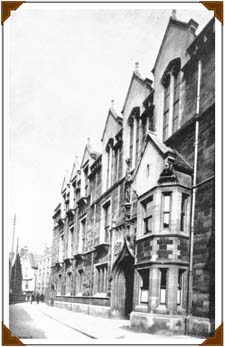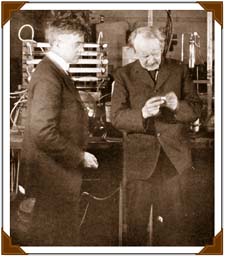
Thomson and classmates at
Cambridge University, 1879.
|
 oseph John Thomson was born on December 18, 1856 near Manchester, England. His father died when "J.J." was only sixteen. The young Thomson attended Owens College in Manchester, where his professor of mathematics encouraged him to apply for a scholarship at Trinity College, one of the most prestigious of the colleges at Cambridge University. Thomson won the scholarship, and in 1880 finished second in his class (behind Joseph Larmor) in the grueling graduation examination in mathematics. Trinity gave him a fellowship and he stayed on there, trying to craft mathematical models that would reveal the nature of atoms and electromagnetic forces. oseph John Thomson was born on December 18, 1856 near Manchester, England. His father died when "J.J." was only sixteen. The young Thomson attended Owens College in Manchester, where his professor of mathematics encouraged him to apply for a scholarship at Trinity College, one of the most prestigious of the colleges at Cambridge University. Thomson won the scholarship, and in 1880 finished second in his class (behind Joseph Larmor) in the grueling graduation examination in mathematics. Trinity gave him a fellowship and he stayed on there, trying to craft mathematical models that would reveal the nature of atoms and electromagnetic forces.
|

The Cavendish
Laboratory, Cambridge.
|
"J.J. was very awkward with his fingers, and I found it very necessary not to encourage him to handle the instruments! But he was very helpful in talking over the ways in which he thought things ought to go." -- H. F. Newall, onetime assistant to the young Professor Thomson.
|
|
|
 he Cavendish Laboratory at Cambridge had been founded in 1871 with James Clerk Maxwell (who developed the basic equations of electromagnetism) as the first Cavendish Professor. The young Thomson was chosen to be the third Cavendish Professor in 1884 (following Maxwell and Lord Rayleigh). He was inexperienced in doing experiments, but he learned quickly and presided over a flourishing of experimental physics at the Cavendish. Supported by his administration and teaching, many important experiments on electromagnetism and atomic particles were performed and many outstanding physicists received their early training, including seven Nobel prize winners and 27 Fellows of the Royal Society. Thomson took an active interest in the work of all the young researchers at the Cavendish, daily checking on their progress and often making suggestions for improvements. he Cavendish Laboratory at Cambridge had been founded in 1871 with James Clerk Maxwell (who developed the basic equations of electromagnetism) as the first Cavendish Professor. The young Thomson was chosen to be the third Cavendish Professor in 1884 (following Maxwell and Lord Rayleigh). He was inexperienced in doing experiments, but he learned quickly and presided over a flourishing of experimental physics at the Cavendish. Supported by his administration and teaching, many important experiments on electromagnetism and atomic particles were performed and many outstanding physicists received their early training, including seven Nobel prize winners and 27 Fellows of the Royal Society. Thomson took an active interest in the work of all the young researchers at the Cavendish, daily checking on their progress and often making suggestions for improvements.
 iss Rose Paget was among the researchers at the Cavendish as one of the first generation of women permitted into advanced university studies. She performed some experiments on soap films in 1889 after attending some of Thomson's lectures. J.J. Thomson and Rose Paget were married on January 22, 1890. They had two children: George Paget Thomson, who became a prominent physicist himself, and Joan Paget Thomson, who in later years often accompanied her father in his travels. iss Rose Paget was among the researchers at the Cavendish as one of the first generation of women permitted into advanced university studies. She performed some experiments on soap films in 1889 after attending some of Thomson's lectures. J.J. Thomson and Rose Paget were married on January 22, 1890. They had two children: George Paget Thomson, who became a prominent physicist himself, and Joan Paget Thomson, who in later years often accompanied her father in his travels.
|

Thomson at work.
|
 homson's achievements were honored in numerous ways, and mark him as among the most accomplished physicists of his era. In 1906 he was awarded the Nobel prize in physics for his researches into the discharge of electricity in gases. In 1918 he was chosen Master of his old college, Trinity, and the
next year he resigned the Cavendish Professorship. He guided Trinity with his usual common sense and benevolence until shortly before his death on August 30, 1940. homson's achievements were honored in numerous ways, and mark him as among the most accomplished physicists of his era. In 1906 he was awarded the Nobel prize in physics for his researches into the discharge of electricity in gases. In 1918 he was chosen Master of his old college, Trinity, and the
next year he resigned the Cavendish Professorship. He guided Trinity with his usual common sense and benevolence until shortly before his death on August 30, 1940.
|
|
|
Table of Contents:
Exhibit Home
J.J. Thomson 
Mysterious Rays
1897 Experiments
Corpuscles to Electrons
Legacy for Today
More Info
|
 Mysterious Rays Mysterious Rays
|




